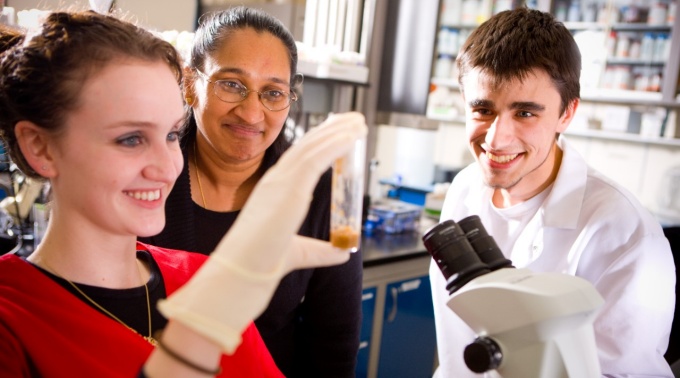Neuroscience Major (BS)

Neuroscience faculty mentor Shermali Gunawardena (center), expert on the biology of neurodegenerative diseases, and her mentees examine a sample in their lab.
Neuroscience is an interdisciplinary field of study that allows individuals to decipher the nervous system which guides all behavior, and cognition. In this program, you will examine the function and dysfunction of the brain through the utilization of a molecules-to-behavior approach.
A bachelor of science in neuroscience will prepare and make you competitive for further study in both professional and graduate school. In addition, you will be well-equipped to enter the job market in which neuroscience has become an increasingly driving force.
Program Learning Outcomes (PLOs) define what students will know and be able to do because they have successfully completed the undergraduate neuroscience program. Assessment is conducted on a regular basis to determine to what extent students achieve the PLOs, to guide program modifications, and to improve teaching and learning practices.
- Students will develop literacy in the neurosciences with particular emphasis on the cellular and molecular mechanisms that make up the central nervous system as well as the physiology and pathophysiology of disease and treatment of disease states that will make them qualified candidates for a wide variety of biomedical career opportunities, including; professional school (i.e. Medical School, Dental School, Law School), advanced research, pharmaceutical research & development, and other health professions.
- Students will be able to reframe the current challenges of understanding how the brain functions in health and disease to develop insights into how the brain controls behavior.
- Students in the program will be able to relate the basic connectivity and anatomy of the human brain and how such connectivity may impact disease states.
- Students will be able to coalesce information across a wide range of basic sciences and disciplines applying them to a clinical and translational understanding of the brain.
- Students will be able to integrate the organization of the central nervous system and the physiology and pathophysiology of disease and treatment of disease states to create an inclusive background of modern medical neuroscience.
- Students will be able to relate the cellular and molecular mechanisms that underlie both behavioral and cognitive dysfunction in the central nervous system to changes in central nervous system physiology in both adult and developing central nervous system resulting in diverse and debilitating neurological disease.
- Students will be able to apply the neurosciences at the level of individual genes, cells, organs, neural circuits and animal/human behavior and importantly
- Students will be able to evaluate how these processes can become dysfunctional and give rise to neurological and neuropsychiatric disease.